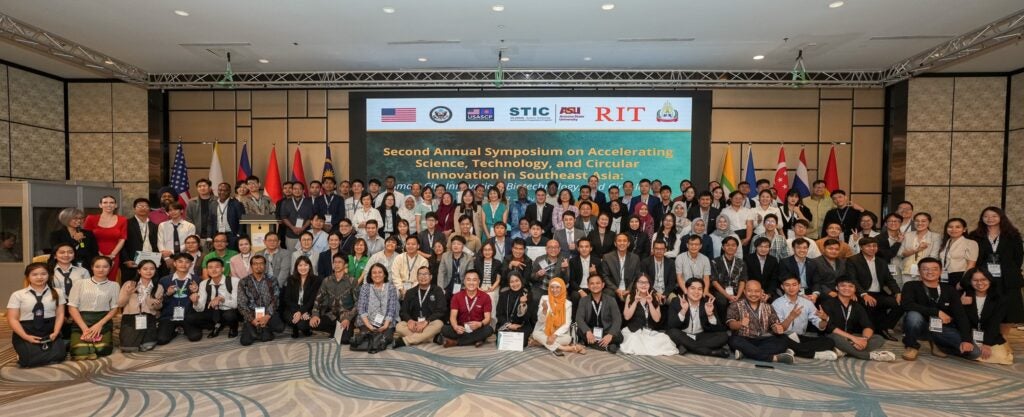Second Annual Symposium on Accelerating, Science, Technology and Circular Innovation in Southeast Asia: Smart Cities Innovation, Biotechnology, and Circularity
July 17 – 19, 2024
The U.S. Department of State hosted the second annual Symposium on Accelerating Science, Technology, and Circular Innovation in Southeast Asia: Smart Cities Innovation, Biotechnology, and Circularity in Vientiane, Lao People’s Democratic Republic (Lao PDR), with a focus on Smart Cities Innovation, Biotechnology, and Circularity. The U.S.-ASEAN Smart Cities Partnership (USASCP), The U.S-ASEAN Science, Technology, Innovation and Cooperation Program, implemented by Arizona State Univesity, and Rochester Institute of Technology (RIT) jointly developed this three-day event, which underscore three critical regional issues: education and training, circular economy and innovation, and climate resilience. This event brought together public, academic, and private sector actors across multiple disciplines.
Throughout the Symposium, USASCP hosted a series of presentations that highlighted programs across a range of sectors, including Green Buildings Innovation and Water Smart Engagements (WiSE).USASCP announced its Smart Cities Business Innovation Fund 2.0, capitalized at $3M, to catalyze net zero urban innovation and sustainable businesses [“Pending availability of funding]. The WiSE program pairs water utilities from U.S. cities with ASEAN cities to increase water security in ASEAN partner cities through sustainable water management solutions. The Symposium highlighted WiSE partnerships between San Francisco Public Utilities Commission and the Saigon Water Corporation of Ho Chi Minh City; The Water Council of Milwaukee and the Provincial Waterworks Authority of Phuket; and the Clean Water Services of Hillsboro and the Vientiane City Office for Management and Services to demonstrate the outcomes of the city partnerships and success in the final year of its tenure.
The Circular Entrepreneurship program, a flagship of RIT, expanded its training partnerships across the entire ASEAN region and invited universities, business incubators and accelerators to the Symposium. Dr. Reudiger Kuehr, UNITAR’s Sustainable Cycles (SCYCLE) Program, opened the Circular Economy and highlighted the work of the multiple stakeholders, including, the Economic Research Institute for ASEAN [ERIA], and the Governments of Japan and Indonesia to advance circularity initiatives, in support of the ASEAN Circular Economy Framework of 2021. RIT presented its material flow analysis research as well as its ongoing work to better understand the role of the informal sector in the ASEAN e-waste trajectory. The final panel discussion featured Seagate Technologies and Mitsubishi Metals, among other private sector actors to share operational and financial challenges to promote sustainable e-waste supply chains in the region.
ASU hosted the U.S.-ASEAN Science, Technology, and Innovation Cooperation (STIC) business venture pitch competition, and research project presentations, which culminated in the disbursement of $100,000 worth of awards supporting business ventures and research proposals advancing technology innovations across ASEAN member states. Biotechnology constitutes a significant proportion of the research proposals showcased during the symposium, reflecting its crucial role in advancing scientific knowledge and addressing contemporary challenges in ASEAN region.
Winners of the Research and Publishing Seed Grant:
- Siraphat Taesuwan (Thailand): Project Optimizing Protein and Choline quality in plant-based meat using economical and sustainable enzyme cross-linking technic.
- Angga Hermawan from National Research and Innovation Agency Indonesia, with the project Upcycling Waste Battery into Electrocatalysts for Sustainable Hydrogen Production and Biomass Valorizations (Bat-HyBio)
- Attakarn Jansasithorn from Clean Energy Systems Integration Laboratory of Thailand, with the project Design and development of a high start-up torque Vertical Axis Wind Turbine for sustainable micro-grid systems in Thailand national parks
- HO THI LUU from Vietnam, with the project of Development of Hybrid Cell Membrane-Derived Nanovesicles for Enhanced Tumor Targeting and Drug Delivery in Cancer Treatment
Winners of the Business Venture Seed Grant:
- Le Thi Thu Ngan (Shoes Agtech JSC – Viet Nam) with the ultra-lightweight vehicles for rice field navigation, addressing agricultural challenges, targeting drone service companies, and aiming for significant market scalability, with IP protection and external funding.
- Jeremy Cerilla De Leon (“Make-roscope” Project – Phillipines) with the invention of affordable keychain microscope that sticks onto any smartphone or tablet, turning it into magnigication tool.
- Muhammad Naufal Nabiel (HerLens – Indonesia) with an AI-driven tool, aims to improve cervical cancer detection by enhancing VIA test interpretation for primary healthcare providers in Indonesia, addressing infrastructure constraints and offering competitive pricing for scalability.
- Duong Tiet Anh (AirX Carbon’s NetZero Pallet – Viet Nam): This initiative made pallet from coconut husk waste, offers a sustainable alternative to traditional pallets, aiming for significant growth while empowering rural communities and contributing to environmental preservation.
In the final session, the Rochester Institute of Technology hosted a session on Circular Textiles to discuss waste problems in the textile industry and showcased opportunities to increase its sustainability. This integrated event with public and private sector partners emphasized the U.S. commitment to advancing science, innovation, and resiliency across the ASEAN region.
